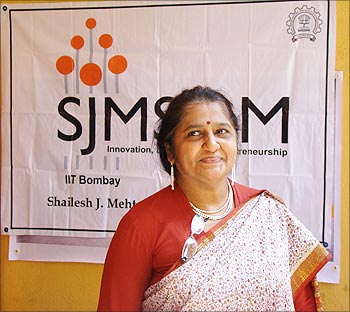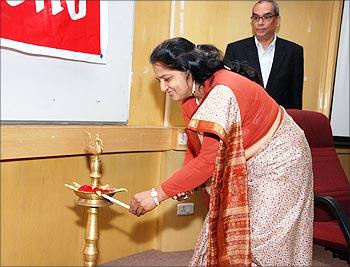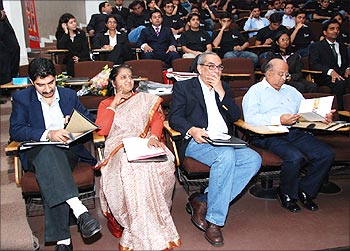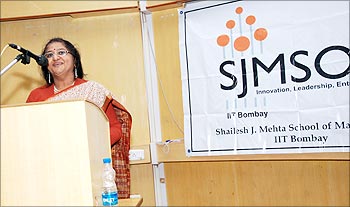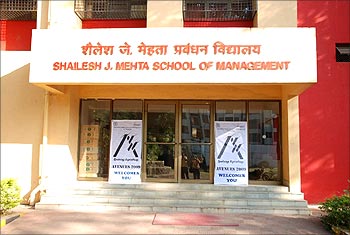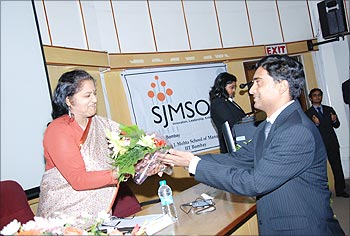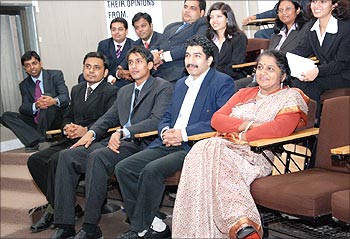 | « Back to article | Print this article |
'Our average student outperforms the brilliant American'
Karuna Jain is the first woman to head a B-school in India. Head of the Shailesh J Mehta School of Management at IIT-Bombay, she is excited about the growing number of women at the helm of banks and financial institutions.
"It is so good to see women establish themselves. When I took over, there were many who were sceptical about how I would handle things. But I am glad I proved them wrong," says an optimistic Karuna Jain.
"Women by nature are careful, meticulous and well prepared. This is what helps women to rise high in financial services as due diligence is vital in financial services," says Jain.
India is competitive in terms of imparting quality education, she believes. "Our primary and higher secondary education is far superior, our IQ level is very high too. Our average student outperforms the brilliant American," she claims.
She questions the rationale of creating new IITs (Indian Institutes of Technology) and IIMs (Indian Institutes of Management) when they are already faced with a faculty and fund shortage. The biggest challenge she faces is getting good faculty. She points out that nobody wants to take up the teaching profession.
"Students in the B-school earn three times more than me on the first day. What I earn in a year, they earn in a month," she says.
Karuna Jain shares her views on management education, faculty shortage, the challenges she faces, and the exciting experience of over two decades of teaching and mentoring students.
How does it feel to be head of a management institute?
It feels very good to be in such a position though there are several challenges. It has been an interesting journey and I have been quite successful despite all odds. I don't look at myself as a woman, but women have to work really hard to prove themselves.
There have been times when people have tried to pull me down, but that has not affected me. They have tried to tell me, 'Don't think you can get away because you a lady', and I have told them, 'I am not a lady, I am your boss!' You have to be really strong. I have always been strong.
In terms of the achievements by the institute, the number of job offers, salary scales and research work have improved after I took over so I am quite satisfied.
The faculty strength has doubled in two years. But I have to increase it by 30 per cent in a year's time.
'Our average student outperforms the brilliant American'
Many think teaching or being a part of an academic institute is a cozy job, but it is not. It is tough as management education is very competitive.
There are many challenges: fulfilling the demands of the students, they want contemporary courses so there is always a paradox as to what is an appropriate mix, how much of theory knowledge is desired and how much practical knowledge is to be given. To create a good mix of theory and practical is a challenge.
Being a technology-dominated institute, it is tough to sell your capabilities in the marketplace. It is still tougher to lure good faculty members. Faculty shortage is a major problem.
In the IIT-set up, research is given more importance than generating funds. Another problem is that in a place where the institute is technology-driven, management is a soft target as our requirements are different from that of a technical institute.
How has the institute progressed in terms of research and placement offers?
In 2007, we had 9 PhDs, more than what all the IIMs together had. Our research focus is pretty good.
The placements scene has improved after I took over. I don't want to take credit for this but when I took over in 2006, the average offer was at Rs 7.5 lakh (Rs 750,000). In 2007, it was Rs 9.76 lakh (Rs 976,000), in 2008 it was Rs 13.96 lakh (Rs 1.396 million). Last year I thought we would be badly hit but we got it around Rs 10.03 lakh (Rs 1.003 million).
The year 2008 was really good as we had 3 jobs per student. This year it has gone down to 1.5 , that is 90 job offers for 60 students.
But the students are not getting paid for their expertise. Most of our students are engineers, and for the value addition they give, they are not paid well. A management guy may get more pay than these guys.
'Our average student outperforms the brilliant American'
We take students based on a competitive exam. We take only engineers. There has always been less number of girls for engineering courses. But this year it is much better. Ten per cent of the students are girls this year; earlier that figure used to be 3-4 per cent.
When I studied engineering, in our college of 5,000 students, there were just 2 or 3 girls. So it has got to do more with the social system.
Even now there are many communities, where co-education is not allowed. I went to a girls' school. I went to a co-ed institute for the first time when I joined engineering. Even though the ratio of boys to girls is skewed, even at the B-schools, in academics and in placements, girls do equally well.
Does the quota system help?
I am against any kind of quota business, irrespective of the reason. If girls are not getting the right environment, we should provide it for them. We should develop the capabilities for the underprivileged to compete with others at some level.
If we go on offering them everything at concessional rates, they get the feeling that they can get away without doing anything.
How long can this continue? Someday there will be a lot of frustration as we would fail to create an attitude to build capabilities and compete with others based on the capability. This is harmful for our country.
We are not growing the way we should because of the quota system. We create quotas for everything and keep aside our competence.
'Our average student outperforms the brilliant American'
It is the responsibility of the nation to provide education to everyone. So you can either upscale the existing system and maintain the same quality/standard or you create a new system and bring them to that level. I would prefer the latter because once the culture is built, scaling up becomes much easier, rather than building something new and build the culture as it takes a longer time.
Today, IITs have a brand value after 50 years of hard work and efforts. Emulating this at a new place would require at least twenty years.
You cannot create academic institutes by just making new buildings. You need good teachers and you cannot create teachers overnight. Unless we have more teachers, we cannot impart quality education.
The plan should ideally be toward creating more teachers.
Do you face a faculty shortage?
This is the most serious problem we face in India and all over the world. Nobody wants to take up the teaching profession. People even say we are stupid to become teachers.
One problem is the compensation package; we can earn ten times more if we take up any other job. My students earn three times more than me on the first day. Our doctoral students earn five times more than me. What I earn in one year, my students earns in one month.
Gone are those days where we believed in a value system. The value systems today have completely changed. My father said one should not charge for imparting education. If that is the case there would be no coaching classes today. Goddess Saraswati has nothing to do with money. But this is no longer valid.
'Our average student outperforms the brilliant American'
Most of them want to take up a job first. They want to have corporate experience, to learn management and implement it in large organisations and then start ventures on their own.
There is a huge interest in entrepreneurship. Last year, we created an entrepreneurship club. This year we are launching an interesting initiative called the e-garage. Young entrepreneurs from the IIT and management professionals from the SJ Mehta School of Management will come together to work on new ventures. It will be a perfect combination of a technical expertise and management skills.
Even though the management grads are engineers, IIT-ians have the advantage of being abreast with the latest technology. E-garage will provide a perfect ecosystem for entrepreneurship to flourish.
Are more students preferring go abroad? Do you think brain drain is still happening?
Last year, we got five offers from MNCs for positions in India. I don't think many people want to go abroad now. The trend is changing; many of my friends are now coming back to India.
Earlier, there were many opportunities abroad, but that has changed now. They see more opportunities in India today. Brain drain is hype, actually. A good majority of people go abroad to pursue higher studies.
Can we cut down on the number of students going abroad to study?
No, we can't. In India we do not have the facilities to accommodate 450,000 students to do MTech. We don't have the infrastructure. There is a huge demand supply gap here whereas in foreign countries there large universities and less number of students. So students will continue to go abroad.
But if you take the quality of education, we are competitive. Our primary and higher secondary education is far superior than theirs, our IQ level is very high too. Our average student outperforms the brilliant American.
I have realised this from my 20 years of teaching experience. I have figured out that my son is far better in Maths and Science compared to his cousins (older than him) who study abroad. Of course, there may be situations where it may not be true.
'Our average student outperforms the brilliant American'
We do evaluate plans. We hold competitions like the Eureka at IIT. We organise a programme called Navonmesh, where upcoming startups are encouraged. We hold a competition for the startups with the best feasibility plan.
Some of them even get funding from angel investors who come to judge their plan. While Eureka is about ten years old, we have been conducting Navonmesh for the last three years. The interest and spirit among students in terms f entrepreneurship is huge.
One of our faculty members -- Prof Rajendra Sonar -- owns a startup and recently won an award in the five-year-old startups category. The success stories emerging from our B-schools are very interesting.
Most of the students study engineering for four years, then they pursue a management course and finally end up doing jobs, which may not be related to what they studied. What are your views?
It is not true, but if they are selling soaps then they are deviating from their expertise. But these days most of the businesses are technology-oriented and have sensitivity toward technology really helps.
I use the word sensitivity because being an electrical engineer. I may not understand mechanical aspects, but I can certainly understand what kind of constraints that can come up and use my engineering skills in enhancing products and services. This understanding is very crucial.
Instead of having pure technology people who talk only about functionality or people who just know the financial aspects, a technology person with a management degree makes you a better decision maker, a better manager.
Should more start-ups be promoted?
Definitely, startups need to be promoted. We need to create an ecosystem that allows entrepreneurs to come up. We do not have the right ecosystem to promote startups. But it has improved in the last two decades.
The hardships that young entrepreneurs face are much less today than it used to be 10-15 years ago. We need to grow on this aspect as our economy is large. We need more angel investors and venture capitalists to invest in bright ideas and do the hand holding as the risk level has gone down from 80 per cent to 20 per cent.
If you go to Silicon Valley, you get to see such hand-holding and mentoring process. It has become a culture there. We must create a similar culture in India.
'Our average student outperforms the brilliant American'
We are looking at creating programmes that blend research with practice. Right now, they work on programmes that span 3-4 months. We are looking at a master's programme in technology operations, which can be over a longer period of technology 8-10 months.
We are planning to start a one-year executive MBA programme. It has been approved by the senate but we are working out the operational details.
Being in the IIT set up, we are also looking at giving research inputs to the management world. One of the areas we would focus on is entrepreneurship and innovation. We are planning to start a centre of excellence to take up large projects.
The heads of all the B-schools of IITs are looking at creating an IIT B-school brand, work together on some projects. We are also looking at building technology entrepreneurships as we have the support of all the IITs.
IIT-Madras and IIT Kharagpur are already doing projects in collaboration with IIM Calcutta. This is the need of the hour. We need to make the best use of our technology and management education. We have also been approached by the aviation regulatory authority to conduct studies. So 'consultancy projects' is another area we will focus on.
What has made you successful?
There are many things...the desire to be successful, dedication and commitment to the profession are the main aspects. Once I take up an assignment, I put my heart into it. I don't take up a project if am not sure I will be able to justice to it.
What is your advice to people who want to pursue management education?
They must understand the nuances of management and go for education. I would suggest they get some experience before they join for this course. This would help in understanding the management principles better.
We decided to take freshers so that they are not biased to any particular style of function. Even at IIMs, graduates find it difficult to understand certain things. So it is advisable to get some experience and learn so what would be valuable to them, they have to decide what they would like to specialise in.
This will put them on a right track as a bachelor's degree is a just a foundation course, but a master's degree creates a unique skill set based on your strengths.
